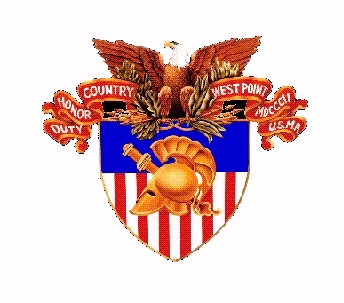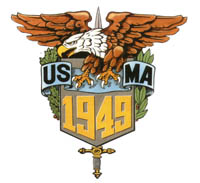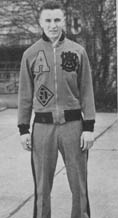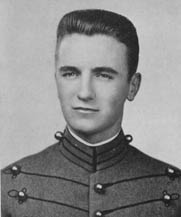MILAN MOSNY 5 December 1926-6 January 1955 MILAN MOSNY
was born in Little Falls, NY, the son of John and Kristina Mosny. His was
a remarkable family. He and his five brothers were "the pride of Little
Falls" for their prowess on the basketball court. The 27 Jan 1977 Little
Falls Evening Times stated, "High school Milan Mosny joined
the Class of'49 at West Point in 1945. During Plebe year, like the rest
of us, he survived. He went out for basketball but was discouraged when
told he was too small to be able to compete at the college level. The next
year, he played on the B-Squad, earning a monogram. Second Class year,
he started on the B-Squad, but two weeks later was On graduation leave, Mo and Sheets joined a small group, organized by Bill Wilbur, to visit Europe. They traveled space-available on the USS Comfort, a small hospital ship sailing to Bremerhaven. The ship was practically empty, but our '49ers were delighted to find a group of nurses and Red Cross girls as fellow passengers. Upon arrival in Germany, most of the group acquired motorcycles. Ben and Mo went straight to Paris, where they joined Ben's cousin from Princeton. Being on a tight budget, they looked for modest lodgings, which they found in an area not normally seen by tourists. Mosny was pleased to find his French actually worked: Well, it usually worked, but when it came to ordering in restaurants, it occasionally ended in disaster. Mo kept a diary, and each afternoon, before the evening festivities, we would sit down and suggest appropriate entries for that day; entries that seldom resembled reality. After a week, he threw the diary away. Suffice it to say that we met interesting people and did interesting things. After a week in Paris, we continued on the rest of the trip. We rented an old French Ford and headed south through the Chateau country to Cannes. At first, all went well, with all three sharing the driving; soon, however, it became apparent that Mo was an inexperienced driver. Ben should have known this, as Mo had bought a car just before graduation but had no license and didn't know how to drive! Ben taught him as much as he could before graduation. Mo was fine on level roads, but we had to remove him from the rotation going through the mountains. Little did we know what an aviator he would become! It came time to go home, and we were actually looking forward to our new careers. Sad to say, I was never to see Milan again. Milan reported to Perrin AFB, in Sherman, TX, in August 1949 for Basic Pilot Training. A year later, he was assigned to Williams AFB, in Chandler, AZ, for advanced training on the F86D fighter. Mo had found his calling! Classmates used to fly crosscountry to other bases to build up flight time, as well as increase bonding with classmates at other bases. During those visits, they rarely met up with Mosny, as he was usually up flying. They found that he was logging an incredible number of hours, far more than most of them. CPT Mosny was reassigned to the 35th FighterInterceptor Group in Japan, where he served on the group staff. He had become a motivated, skillful, and dedicated officer with a great career ahead, but it was not to be. The evening of 6 Jan 1955, Mosny was on a night intercept training exercise. He and his co-pilot were flyingT 33 Jet Training Aircraft, acting as the target for an F86D. Both planes were under radar control under the direction of the normal air defense system in Japan. Three successful intercepts had been completed before the final run. At approximately 10:00 pm, the two aircraft collided in the air at 25,000 feet. The details of what exactly happened remain unknown, except that all three pilots were killed. Milan's body was found in Tokyo Bay the next morning. CPT Mosny's commanding officer stated, "Mo was one of the most promising officers I have known. His Academy background and his flying ability were great assets, but were secondary to the man he was. Mo was a favorite, both in the squadrons and in the group, and always was actively engaged in his spare time. He was a member of my staff, valuable, well liked, and respected. Our personal sense of loss is deep. He was a good personal friend." A classmate stated, "it would have been a joy to have had him continue as a brethren pilot, something we all felt. Nobody warned us of the rather high accident-wash out ratio and the dangers of the military pilot-not that it would have made any difference, though." His parents; five brothers John, Marty, Albie, Paul, and Dan; and a sister, Olga, survived Milan Mosny. With the exception of his parents, all of them are alive today. His roommates, several classmates, and his brother John prepared this memorial. We are also in debt to the class e-mail program that brought many of us together on this project. |


 basketball
is alive and well in Little Falls. However, it doesn't seem the same without
the late great coach Wilbur Crisp on the bench and a Mosny in the lineup."
But Mo wasn't just a basketball player. He also graduated at the top of
his high school class and gave the valedictory address at graduation.
basketball
is alive and well in Little Falls. However, it doesn't seem the same without
the late great coach Wilbur Crisp on the bench and a Mosny in the lineup."
But Mo wasn't just a basketball player. He also graduated at the top of
his high school class and gave the valedictory address at graduation.
 promoted
to the A-Squad. He became the highest scorer on the team for the next two
years, earning two major "A's." He also played varsity baseball and ran
cross-country. Mo was normally quiet, but on the court he was a tiger.
Academically, he was in the upper third of the class and earned the Modern
Language prize in French. Milan roomed with Ward Goessling for three years,
with Ben Sheets joining them for First Class year.
promoted
to the A-Squad. He became the highest scorer on the team for the next two
years, earning two major "A's." He also played varsity baseball and ran
cross-country. Mo was normally quiet, but on the court he was a tiger.
Academically, he was in the upper third of the class and earned the Modern
Language prize in French. Milan roomed with Ward Goessling for three years,
with Ben Sheets joining them for First Class year.